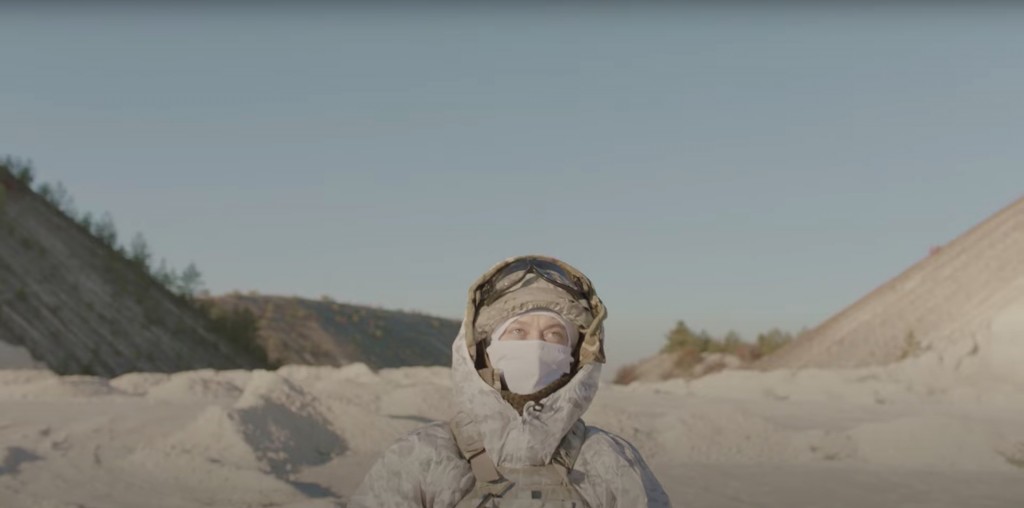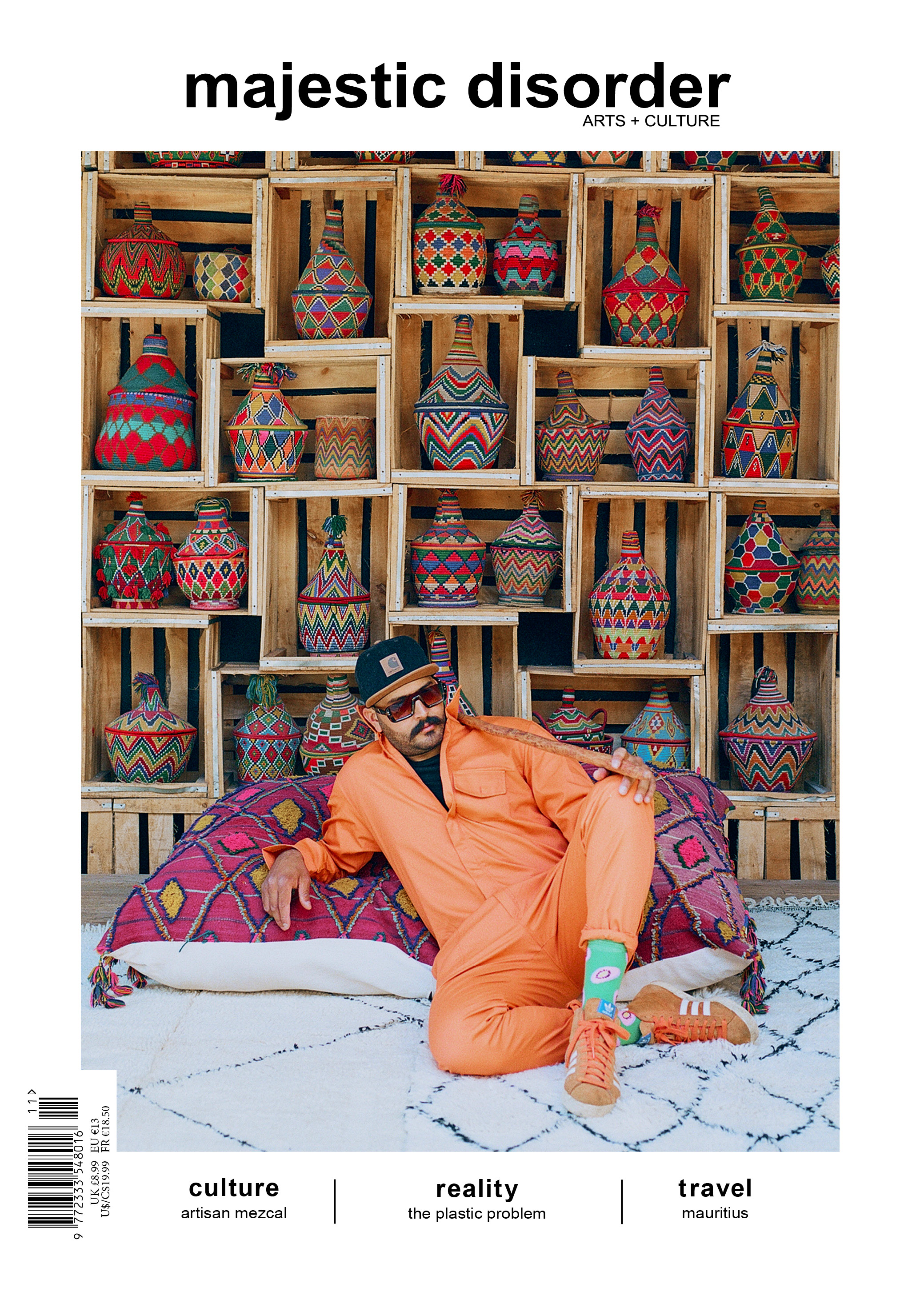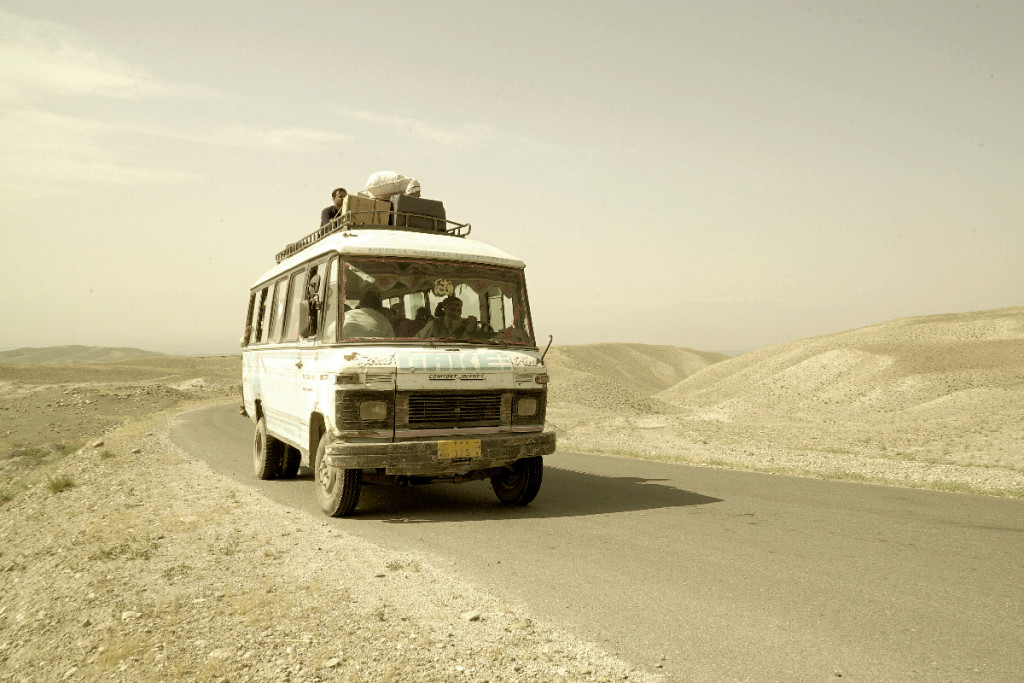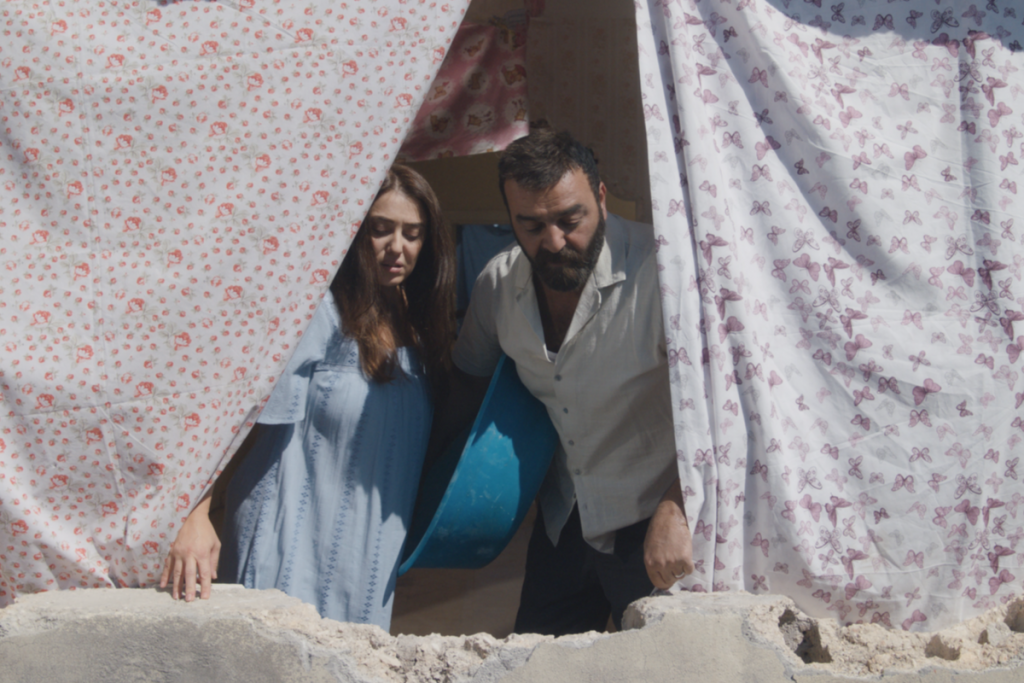THE WAR AT HOME
Ukrainian director Maksym Nakonechnyi details the journey to his feature debut Butterfly Vision
Words Sean Stillmaker
Just after the Beijing Winter Olympics closed in February, the world shook in horror as Russian military committed a full-scale invasion of Ukraine. It’s been over a year of tragedy, but for Ukrainians, this has been a war they’ve been fighting for over nine years now.
The armed conflict in Donbas, the eastern region of Ukraine bordering Russia, has been marred in combat with Russian military and Russian-backed separatists since February 2014, beginning just after the Sochi Winter Olympics had closed.
It’s the war in Donbas and its aftermath for soldiers re-entering civilian life suffering post- traumatic stress that forms the narrative for Butterfly Vision, the feature film debut for Ukrainian director Maksym Nakonechnyi.
The film follows Ukrainian soldier Lilia (played by Rita Burkovska), an aerial drone reconnaissance specialist, nicknamed Butterfly. She became a prisoner of war, raped during imprisonment and then after her release found out she’s pregnant. The narrative unfolds how Lilia and her soldier husband Tokha (played by Liubomyr Valivots) resolve this traumatic dilemma and adapt to life off the battlefield.
The fictional film specifically takes place after 2014 but before 2022. It’s a very real story, inspired by true events, and now given the eerie reality of an entire nation at war, holds even greater emotional weight.
“So [the film] discovers this period between two invasions when the war was localised in the east in Donbas and there were two parts of this society — one that was deeply involved, aware and contributing to the war, and another part of the society, like Ukrainian and European society, where they wouldn’t notice that the war is going on,” says Maksym after the film’s premiere.
Internationally traveling for Maksym, or any Ukrainian resident, is not any easy feat. With a full-scale war ongoing, Ukrainian airspace is closed. Men are not obliged to cross the border unless they have special permission, such as the Ministry of Culture signing off Maksym’s exit to promote his made in Ukraine film.
“That is one part,” says Maksym who is based in Kyiv. The other part is that he (or any departing Ukrainian) has to cross Ukraine’s border on the ground, which is traversing battlefields, occupied cities or a barrage of Russian artillery to get to a neighbouring country like Poland, Hungary or Romania. And then once inside those countries, travel to an airport.
“I’m aware this is how it was hundreds of years ago when the road would take from one to several days to get to another direction. It’s nomadic living indeed,” he says.
The poetic symmetry of “nomadic” living is not lost on Maksym as his film production company, Tabor, translates to “nomadic camp.” He founded Tabor with filmmaker friends Alina Gorlova (Butterfly Vision’s editor) and Yelizaveta Smith (Butterfly Vision’s producer).
Tabor was founded in 2014, which is a year that shall forever remain seminal for Maksym as it was the year he suffered a personal loss with a family member passing, it cemented his professional direction in cinema and the revolutionary trajectory of Ukraine.

Revolution was brewing in the fall of 2013 as protestors gathered and encamped in Kyiv’s Independence Square, or Maidan. Soon it swelled to over a million people peacefully protesting. In January 2014 former Ukrainian President Viktor Yanukovych (an allay to Putin) passed anti-protest legislation. In February it climaxed when over 100 protestors were shot.
“Me and my friends were participating, protesting and filming all the protests,” Maksym says. “So we saw eventually how everything burst out and the mass shooting on the protestors.”
Immediately afterwards, Yanukovych fled to Russia, an interim president presided with full elections that May (Petro Poroshenko won and served until Volodymyr Zelenskyy was elected in 2019). Then the War in Donbas broke out after Russia annexed Crimea, Ukraine’s eastern peninsula on the coast of the Black Sea, in March 2014.
Afterwards it became clear for Maksym what lay ahead in his path. “Me and my colleagues, we were trying to be involved in the context of war as filmmakers, as artists. We would make various documentaries or participate in different cultural volunteering activities.”
The first key step that led Maksym to making Butterfly Vision was the Tabor-produced documentary School #3, which was awarded Grand Prix in the Generation 14+ at the 67th Berlin Film Festival in 2017. It was co-directed between Yelizaveta (Tabor co-founder and Butterfly Vision’s producer) and German theatre director Georg Genoux.
“School #3 became like the gates for us to the big film industry. We made it with our own resources, like it had no budget at all,” Maksym vividly recalls.

The documentary follows 13 school children from the small town in Mykolaivka, of the Donbas region, who witnessed the war, the bombing of their school and its reconstruction led by a group of passionate volunteers.
The ’17 film documentary was based on the documentary stage play My Mykolaivka by Ukrainian playwright Natalya Vorozhbit, who also has a supporting role as the character Magpie in Butterfly Vision. Natalya co-founded the Theatre of Displaced People with Georg, both of whom brought My Mykolaivka to the stage. The play features the original autobiographical texts written and performed by the children, which premiered in 2015 and then toured in Ukraine.
“After [Berlinale and School #3 awarded] we understood how the industry works, but we were prepared to stick to what is going on in the country,” Maksym says. “You just follow what you feel and consider important.”
Between 2014 and 2021 the war in Donbas had an estimated 14,000 Ukrainians die and more than 2 million internal refugees. Although a ceasefire was declared in February 2015, there was hardly peace in the region, which is all the more palpable now.
Inspiration for Butterfly Vision struck as Maksym was assisting on editing a 2017 documentary, Invisible Battalion, co-directed by Iryna Tsilyk, Svitlana Lischynska and Alina (Tabor co-founder and Butterfly Vision’s editor). The documentary follows the stories of six female Ukrainian soldiers and their experiences.
“The scenes I was editing, the phrases I was hearing, they impressed me a lot and made me think about the female perspective at war, in particular one phrase by one protagonist that the captivity was the scariest thing for her, even scarier than death. This just gave me the idea of this fiction story,” Maksym vividly recalls of Butterfly Vision’s inception.
This particular scene of Invisible Battalion was being directed by Iryna. So he immediately asked Iryna what her thoughts were on taking this further. “First of all, I approached [Iryna] and told her that ‘your documentary gave me an idea of this fiction story. Do you mind if I start writing it?’” Maksym says.
“And then I also offered her to write the story together because, like I already had the plot, but I needed both a lot of perspectives and experiences, which were not mine at that point, because obviously I’m a male and I didn’t serve in the army, and Iryna is a mother and her husband was a veteran back then, and he’s fighting at war now.”

Iryna’s husband is prominent and acclaimed Ukrainian writer Artem Chekh, who’s book, Who Are You, received the 2021 BBC News Ukraine Book of the Year award. Iryna graciously accepted Maksym’s proposal with both him and her sharing co-screenwriting credit on the feature Butterfly Vision.
The film skilfully avoids the war on the battlefront in Donbas and instead entirely focuses on the war within its characters as they adapt to life during the dubious ceasefire. Simple things in life that civilians take for granted become an insurmountable challenge for veterans, like sleeping at night or walking outside unshaken by loud noises.
“I hope people have the conclusion that war is much broader, much wider and much longer than just the hostilities on the battlefield,” Maksym says.
Rita’s performance as Lilia is expressive and moving as she copes with the brutal horror committed, which is a classifiable war crime. Rita even elevates her performance further with method acting physicality by gaining and losing weight for the realistic portrayal of being pregnant throughout nine months.
A lesser production would have the film blemished by the male gaze, but despite being led by a male director, much of the people in front and behind the camera are female. In addition to those mentioned already, other key female filmmakers were cinematography by Khrystyna Lyzohub, production design by Mariia Khomiakova and producer Darya Bassel.
When asked if this was an intentional choice to have so many women filmmakers around whilst creating such a sensitive story on feminine struggle, Maksym casually says no.
“These are just all my friends with whom we always make films together,” he says. “I really tried and hoped to work in such a way to create a space and an environment for everyone to express their own positions and their own stories, related to this world, because for each member of the team, it wasn’t just work for them.”
Throughout Butterfly Vision, Lilia’s trauma is heavily internalised whereas that of her husband Tokha is externalised. Unable to cope, he replaces sedentary life by joining a vigilante paramilitary group with alt-right views that go on to terrorise Romanian refugees. Maksym brilliantly captures this sequence through a social media livestream where users cheer on the militia’s actions hurling their xenophobic racist remarks.
“It’s just brighter and more vivid and sharper how we see the male character who isn’t directly affected — he’s not injured, he wasn’t captured, he’s more or less okay — but still he’s deeply affected and deeply traumatised by the war,” Maksym explains on Tokha’s struggle. “He just turns his aggression towards himself and towards his surroundings and that’s how he keeps like being on the battlefield — inside himself.”
Another powerful scene is when Lilia attempts to use her veteran subsidised fare on a public bus, but the driver does not accept it. This causes a stir with passengers dividing themselves on their viewpoints of the war in Donbas. It’s critical to contextualise this scene as between 2015 and 2021 when there was such a division in Ukrainian society, Maksym says.
“The perception of soldiers in Ukrainian society has changed because war has arrived in every house, like all Ukraine’s citizens have heard or witnessed rockets and bombs arriving. The majority of Ukrainian families have someone from their family fighting or suffering from war,” Maksym says.
The context of the scene was true prior to the invasion of 2022, and maybe years after the war has ended, may be true again. “We are considering our soldiers as heroes, but still you know, it’s very easy for us to consider them as heroes and to call them heroes, while they are there, on the battlefield or in captivity or being treated in hospitals or being dead,” Maksym says. “Once they’re just back into civilian life, and back as part of our everyday society and everyday public interaction, that could be another different deal, I’d say, and that would be another challenge for us.”
Related Reading







 @majesticdisorder
@majesticdisorder